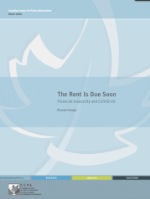Social Watch News
|
Published on Sat, 2020-03-28 00:00
By Roberto Bissio* The message could not have been clearer: "There is a very real threat of a rapidly moving, highly lethal pandemic of a respiratory pathogen killing 50 to 80 million people and wiping out nearly 5% of the world’s economy. A global pandemic on that scale would be catastrophic, creating widespread havoc, instability and insecurity.” This prediction was published in September 2019, several months before the identification of the first Covid-19 patient, by Gro Harlem Bruntland, former Prime Minister of Norway and former Director-General of the World Health Organization (WHO), and by Elhadj As Sy, Secretary General of the International Red Cross and Red Crescent, as co-chairs of the the Global Preparedness Monitoring Board. The Board's report entitled A World at Risk was conclusive: "The world is not prepared." |
| Published on Fri, 2020-03-27 19:12 |
|
Source: . Published on Fri, 2020-03-27 18:05
By Roberto Bissio* The message could not have been clearer: "There is a very real threat of a rapidly moving, highly lethal pandemic of a respiratory pathogen killing 50 to 80 million people and wiping out nearly 5% of the world’s economy. A global pandemic on that scale would be catastrophic, creating widespread havoc, instability and insecurity.” |
Published on Fri, 2020-03-27 10:37
The report by Ricardo Tranjan examines the financial situation of the 3.4 million households in Canada who rent and whose primary source of income is wages and salaries or self-employment income. Everyone will be eventually touched by the economic impacts of the COVID-19 pandemic, but rent is due soon. Specifically, it addresses the following question: How many weeks or months can renters go without employment income before running out of savings? The short answer is that almost half of them have less than a month’s worth of savings; one-third have two weeks or less. |
Published on Fri, 2020-03-27 09:23
Austerity policies pushed by international financial institutions have weakened public health systems, despite current financial support packages, condemning many people to die. As health systems of East Asia, Europe, and the Americas buckle under the strain of coronavirus, developing countries are expecting an even higher human toll. Decades of austerity promoted by international financial institutions (IFIs) such as the International Monetary Fund (IMF), the World Bank, and regional development banks have weakened public health systems, impeding the ability of governments to respond to the pandemic. |
Published on Fri, 2020-03-27 08:50
The United Nations Secretary-General Antonio Guterres on 25 March launched a US$2 billion coordinated global humanitarian response plan to fund the fight against COVID-19 across South America, Africa, the Middle East and Asia. The launch was held virtually in UN headquarters in New York, with the Secretary-General being joined by the UN Under-Secretary-General for Humanitarian Affairs Mark Lowcock, WHO Director-General Dr. Tedros Adhanom Ghebreyesus, and UNICEF Executive Director Henrietta Fore. According to the UN, COVID-19 has killed more than 16,000 people worldwide, and there are nearly 400,000 reported cases. |
Published on Sat, 2020-03-21 10:14
The Covid-19 pandemia is a global health crisis (with major financial and economic consequences) but international organizations, starting with the World Health Organization “are still insufficiently funded to respond quickly to the emergence of dangerous diseases - and to prevent them from spreading to global pandemics” argue Jens Martens and Bodo Ellmers, from Global Policy Forum in a briefing paper published last March 18. People in most Global South countries are likely to suffer its impact even more and therefore “in order to prevent the corona crisis from becoming a global development crisis, solidarity must not end at national borders.” |
Published on Fri, 2020-03-20 12:13
ECLAC’s Executive Secretary, Alicia Bárcena, warned that the region’s economies will suffer the pandemic’s negative consequences via numerous channels. The Executive Secretary of the Economic Commission for Latin America and the Caribbean (ECLAC), Alicia Bárcena, warned today that the Coronavirus (COVID-19) pandemic will have devastating effects on the global economy that will certainly be more intense than and distinct from those felt during the 2008-2009 global financial crisis, adding that Latin American and Caribbean countries will not be spared since they will be affected through numerous channels. |
|
Published on Fri, 2020-03-20 11:41
» |
SUSCRIBE TO OUR NEWSLETTER







